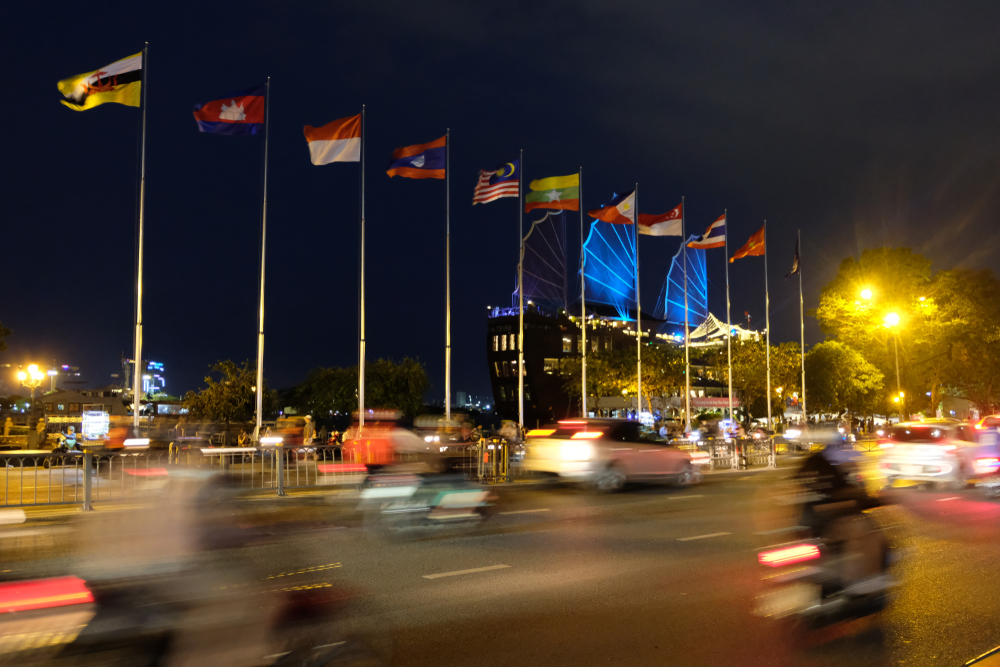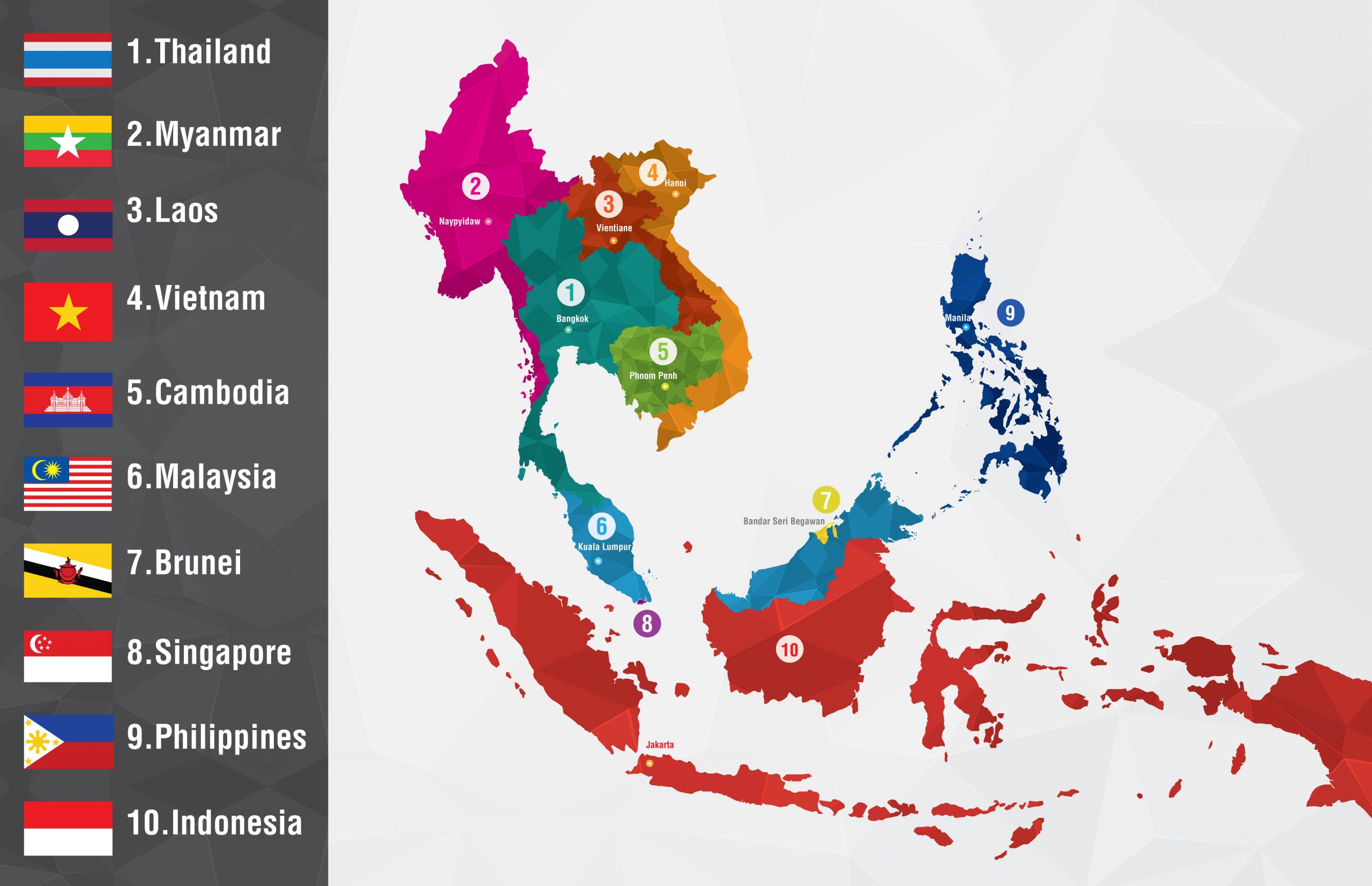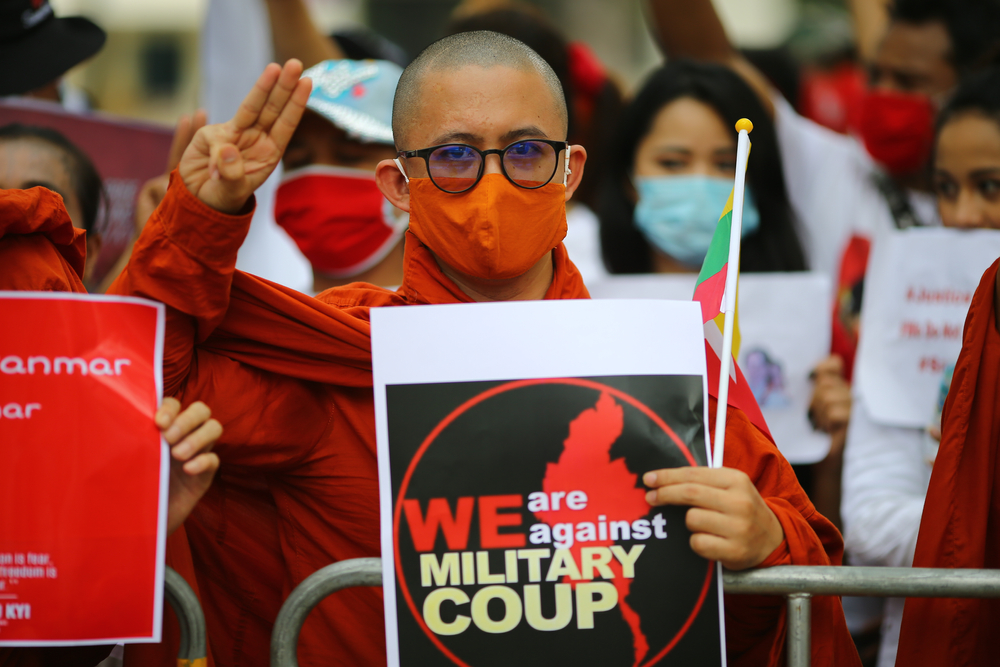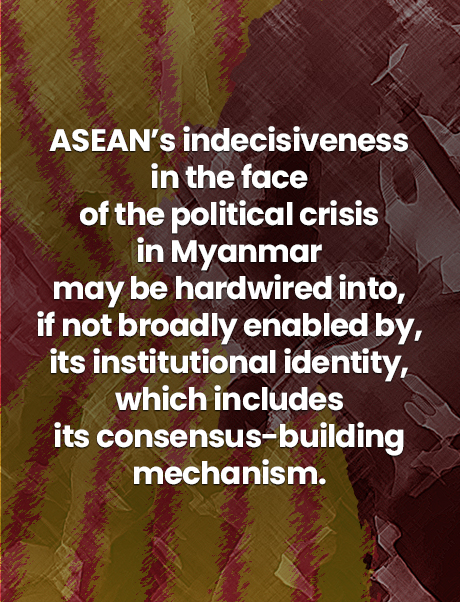When Myanmar’s military launched the February 1 coup that upended ten years of uneasy civilian rule in the country, many outside found out about it via a viral video. In the two-minute clip, an aerobics instructor was doing her usual exercise, dancing to upbeat music, while in the wide, immaculate road behind her rolled a convoy of black military vehicles.
The contrast between the bouncy choreography and the ominous power grab unfolding in the deceptively peaceful background gave the news a bizarre quality, especially at a time when much of the world was still reeling from the impact of a prolonged pandemic.
Over the succeeding weeks and months, however, the global community watched in horror as the violence in the Southeast Asian nation of 54 million people escalated. Its armed forces, the Tatmadaw, had responded to the huge swell of protests with a brutal crackdown, the death toll from which has climbed to more than 700, including more than 40 children.
Thousands more, including high-profile critics of the regime, were arrested — the same fate that earlier befell the country’s civilian leaders, including the head of the ruling National League for Democracy party Aung San Suu Kyi. The event risks squandering a decade of precious political reforms in the country.
Usual ASEAN?
Of all the international organizations that must act, it is the Association of Southeast Asian Nations, or ASEAN, of which Myanmar has been a member since 1997, that runs the risk of greatest embarrassment, said Donald Emmerson, head of Stanford University’s Southeast Asia Program, at a webinar organized by its Shorenstein Asia-Pacific Research Center.
It was never meant to have a foreign policy, he noted, but now that it drastically needs one, “its structure, particularly the ASEAN way, which requires a kind of unanimity, is going to essentially cripple it and prevent it from doing anything constructive with regard to Myanmar.”
Indeed, its less than satisfactory response to the coup and ensuing violence has been roundly criticized, which many argue is par for the course for the group. Three months into the crisis, the demand for a more decisive action is stronger than ever, an institutional test for the 53-year-old regional bloc.
In the immediate aftermath of the coup, none of the nine other member-states of ASEAN condemned the power grab to the same strong, unequivocal degree that many Western nations did.
Indonesia, Malaysia, the Philippines, and Singapore all expressed grave concern and urged the military to find a resolution to the crisis, while Cambodia, Thailand, and Vietnam did not take a position at all, calling it an internal matter.
Things slightly changed after police opened fire on and killed two protestors two weeks hence, which drew sterner words from Singapore and Indonesia. A special meeting of ASEAN foreign ministers in early March, however, fell short of condemning the junta, much less invoke cooperation with other formations like the United Nations Security Council or the UN Human Rights Council.
“Only by moving beyond the ASEAN way of non-interference and consensus we believe that ASEAN can intervene in the Myanmar situation in a meaningful and robust way,” warned veteran Burmese human rights activist Khin Ohmar at a webinar organized by Forum-Asia.
“Failure to do so risks not only further damaging ASEAN’s reputation but also will create further instability and also [affect] the security in the region as a whole,” she added.
When the regional bloc invited Min Aung Hlaing, who led the military coup, to its April summit in Jakarta, it all but confirmed the worst fears of some critics: that the political and humanitarian crisis in Myanmar may be yet another casualty to ASEAN’s characteristic aversion to confrontation, a lax approach to conflict resolution that dangerously borders on complicity.

The ten-member ASEAN’s less than satisfactory response to the coup and ensuing violence in Myanmar has been dubbed par for the course. Three months on, the demand for a more decisive action by the 53-year-old regional bloc is stronger than ever.
As “one of the chief architects of the genocide against the Rohingya,” Hlaing “belongs in a courtroom for his crimes,” said Rohingya rights advocate Tun Khin. “He should not be given a red carpet treatment.”
“Already some have called ASEAN a club of dictators,” Emmerson said. By inviting the junta, the simple association with it and the impression of providing it refuge and legitimacy “would really damage its reputation even more than it already has been damaged by the sense in which ASEAN is irrelevant.”
The invitation also serves to undermine the “vibrant” and continuing popular resistance to the coup in Myanmar, which Ohmar said means the takeover is not yet successful. The junta doesn’t have “control of the country” and is not the even the “de facto government,” she stressed.
“The elected civil government, now under the name of the National Unity Government (NUG), is actually the people’s government, the legitimate government, who is in charge of the local administration in many areas in spite of this military using apparent violence to take full charge and control of the country.”
There is a cruel irony, too, in letting the leader of the junta occupy the country’s seat in ASEAN when from its ranks come those who are responsible for the violence against the people of Myanmar, she said, noting that the NUG is “ready to collaborate and cooperate” with the bloc.
Hlaing is “not the true representative of the people of Myanmar,” Khin said.
Indeed, the coup has made visible what journalist and former BBC correspondent Larry Jagan has described in another webinar as “a new aspiration being voiced for democracy,” led by an invigorated youth sector that is “taking the movement to a new level that we didn’t see in the election.”
Speaking three weeks after the takeover, he noted “millions and millions of people … [in] small villages from towns throughout the country … out on the streets, demanding a return to democracy, respect the elections, and of course release the leaders.”
Any dialogue going forward regarding the future of democracy in Myanmar has to involve the critical but deliberately leaderless group, he said.
The agreement forged between ASEAN and Hlaing during the Jakarta meeting, ostensibly geared to end the violence in the country, has been criticized as lacking urgency and, more importantly, unresponsive to the demands of the protesters, in particular the release of those in jail.
“ASEAN cannot paper over the fact that there is no agreement for the junta to release the political prisoners currently in detention, including senior political figures who presumably would be involved in any negotiated solution to the crisis,” said Phil Robertson, the deputy Asia director at Human Rights Watch, in a statement.
Echoing Ohmar and Khin, Robertson also scored how the “representatives of the Myanmar people” were “left out of the consensus that ASEAN is now patting itself on the action for reaching.”
Failures in the past
For Khin, a Rohingya who grew up in the conflict-ridden Rakhine State and had since become a leading Rohingya rights advocate, the lackluster response of ASEAN today painfully recalls how it also turned its back on the brutal attack against the persecuted minority group more than three years ago, when the Tatmadaw went on a ruthless military offensive that triggered the refugee crisis in neighboring Bangladesh.
“ASEAN did essentially nothing,” Khin said. “To their credit some individual members, notably Malaysia, condemned the Myanmar military, but as a bloc and institution, ASEAN failed to act.”
Khin also cited the association’s now notorious principle of non-interference as key in its silence and lack of “any meaningful action as a genocide unfolded in its own backyard.” The parallels are undeniable; the violence in Myanmar today is carried out by the same military that killed thousands, burned villages, and forced hundreds of thousands to flee, he said.
“It is incredible that other countries continue to defend Myanmar. They hide behind [the] non-interference principle that has caused so much harm to so many people.”
The indecisiveness may be hardwired into, if not broadly enabled by, ASEAN’s institutional identity, which includes its consensus-building mechanism. Forum-Asia’s Cornelius Hanung said a “lack of framework or instrument or precedent” to deal with a range of positions by member-states might be hindering it from reaching a consensus, especially as regards human rights.

Among ASEAN’s ten member-states, Indonesia, Malaysia, the Philippines, and Singapore all expressed grave concern and urged the military junta to find a resolution to the crisis, while Cambodia, Thailand, and Vietnam did not take a position at all, calling the political turmoil in Myanmar an internal matter.
“Although Article 20 of the ASEAN Charter stipulates the decision-making process in the event of non-consensus, the implementation of these articles is considerably weak, as no other member-states has to date been firmly been held accountable for any violation of human rights or democratic principles within their countries,” he said.
Learning from other regional blocs
The seeming incapacity becomes even more glaring when ASEAN is compared to other regional groups that had to deal with military coup situations within their jurisdiction, Hanung added.
In the case of the 2020 Mali coup, for instance, the African Union (AU) issued a statement condemning the Malian military within the day and the Economic Community of West African States met two days later and decided to suspend the country’s membership and impose sanctions.
The day after the coup, the Peace and Security Council, AU’s political security organ, “recommended the suspension of Mali from African Union membership, which was enacted by the by the regional mechanisms,” he noted.
The suspension as well as the sanctions were lifted three months later following the formation of a transitional government.
Meanwhile, it took one day after the 1991 coup in Haiti for the Organization of American States (OAS) foreign ministers to meet and agree to impose a regional trade embargo, Hanung said. Critically, the resolution was transmitted to the UN in order to synergize international efforts, eventually leading to a trade embargo the following year.
The ordeal became a learning experience for OAS, which proceeded to amend its charter to include a specific suspension mechanism for member-states whose democratically formed government is overthrown by force, he said. What would be known as the Protocol of Washington was applied to Haiti in 1993.
What must be done?
None of these steps are being taken by ASEAN to censure the brazen power grab in Myanmar, which is especially heinous considering the astounding death toll and Tatmadaw’s bloody human rights record.
The bloc’s response “[has] not created a concrete action other than dialogue,” Hanung said, and even then the fact that they decided to engage the junta instead of the NUG is hugely disappointing, especially for the people of Myanmar.
He urged ASEAN to “move away from the vagueness of the non-interference principle and towards strengthening mechanisms that address the persistent violation of human rights in the region.”
As a regional body, he added, it needs to acknowledge that a lack of precedent should jumpstart the setting of one, possibly modeled after the experiences of other regional mechanisms.
Severely underutilized in this regard is the ASEAN charter, said Naw Hser Hser, the secretary general of the Women’s League of Burma.
“The ASEAN charter requires all member-states to adhere to the principles of human rights, democracy, rule of law, and the constitutional government — and the illegal takeover of power through a coup was a clear violation of that,” she said.

2021 February 7. Supporters of the beleaguered National League of Democracy stage a protest outside the Myanmar embassy in Bangkok just days after the military takeover in Myanmar. In the immediate aftermath of the coup, none of the nine other member-states of ASEAN condemned the power grab to the same strong, unequivocal degree that many Western nations did.
At this point, the safety and welfare of the people should be the top priority, she added. This means putting an immediate end to the violence as well as ensuring support and humanitarian assistance from the Thai government and the rest of the international community for those who had fled across the border due to the crackdown.
ASEAN must also make a choice between the junta and the people, she said. “It’s important to reject the military and show solidarity with Burma’s people, hear their voice and their pain.”
“It is a must to save people’s lives on the ground,” Ohmar the human rights activist said.
For all its seeming institutional limitations, ASEAN cannot be defeatist at such a crucial juncture in its own as well as the region’s history.
While “we cannot ask ASEAN to be what it is not,” there are “creative ways and means to promote ASEAN’s substantive central role” in helping resolve the crisis as opposed to the mere “convenor role” that many seem to attribute its centrality to, said Moe Thuzar, a fellow at the Institute of Southeast Asian Studies in Singapore.
In the aftermath of the catastrophic Cyclone Nargis that hit Myanmar in 2008, for instance, a tripartite mechanism between ASEAN, the UN, and the Myanmar government was set up, Thuzar said.

Because of its unique position in the complex ecosystem of actors within and outside Southeast Asia, ASEAN’s role as “the main coordinator … for the wider international community’s interests to assist Myanmar’s recovery could possibly start the process of a pause to the bloodshed in the name of humanitarian assistance for the country’s social crisis,” she added.
This very concrete, urgent step will not only abate the suffering of people on the ground, it can serve as a jump-off point for ASEAN to continue to mediate between key stakeholders to bring a more durable end to the political crisis, she said.
Other such options include the imposition of a global arms embargo on Myanmar, even if for ASEAN this might be largely symbolic, as well as individual targeted economic sanctions on the military officers to cut off the Tatmadaw’s source of funding, Khin said.
All this will send a powerful message, he stressed.
Tapping other global mechanisms should also be on the agenda in light of the historical crimes that the Tatmadaw has committed and continues to commit without consequences, as well as the “decades and waves of abuses by the military,” Khin said.
This includes supporting the International Criminal Court’s investigation into the Rohingya genocide and establishing a coordinated response in collaboration with the UN Security Council and Human Rights Council.
“The same people who carried out a genocide against the Rohingya are now in control of the country. This cycle of violence will never end until those responsible face justice.”
For Ohmar, the risk that the crisis in Myanmar will spill over beyond the country’s borders and threaten the security of the region means a tougher, more decisive action is required: the suspension of Myanmar’s membership in ASEAN.
“ASEAN shall only lift this suspension once the military junta accepts the authority of the people’s elected government, the National Unity Government, once it places itself fully, permanently, and unconditionally under NUG control, and once it is brought to the ICC and once democracy is fully established in Myanmar.”
Indeed, while the agreement reached in the Jakarta summit included a call for the “immediate cessation of violence,” there is neither guarantee of this happening nor a mechanism to protect the protesters and hold the junta into account. If anything, the dialogue between ASEAN and Hlaing only serves to buttress the junta’s legitimacy.
Myanmar’s future, she noted, is also the group’s future.
“When Myanmar becomes the first failed state of ASEAN, that means all the spillover effects will be directly imparted within the ASEAN. And this ASEAN vision and mission of building this caring, just, peaceful community of nations and peoples, it will be just lead on the paper but will never be realized.
In the same way that the coup and the resistance to it augurs a sort of historical reckoning for the people of Myanmar, ASEAN faces yet another major test of its mettle and can no longer afford resorting to a comfortable but spineless position. It needs to act now. ●
Glenn Diaz’s first book The Quiet Ones won the 2017 Palanca Grand Prize and the Philippine National Book Award. His second novel Yñiga, on counter-insurgency and political killings in 2000s Philippines, was shortlisted for the 2020 Novel Prize. Born and raised in Manila, he is currently pursuing doctoral studies at the University of Adelaide in Australia.



















